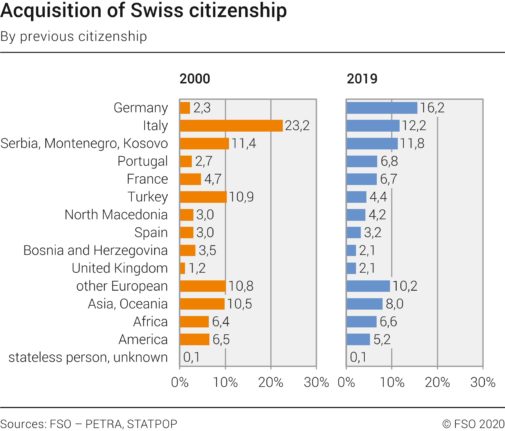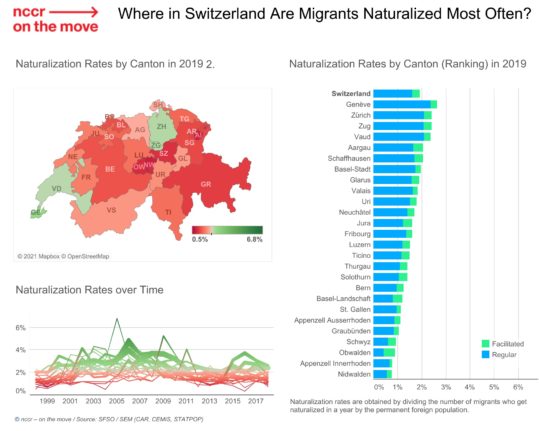IN NUMBERS: How many people become Swiss each year - and where do they come from?

Around a quarter of Swiss residents are foreign. Where do they come from - and how many become Swiss each year?
The naturalisation procedure applies to those who come from abroad as well as to people who were born in Switzerland to foreign parents.
In Switzerland, the naturalisation rate of foreign nationals who hold residence permit is two percent, according to Federal Statistical Office (FSO).
The rate is twice as high for people born in Switzerland than for those born abroad.
In 2019, the last year for which statistics are available, just over 41,000 foreigners received their Swiss passports. This number is slightly lower than in 2017 (about 45,000) and 2018 (42,5000).
Overall, the naturalisation rate among immigrants has been steady in the past decade, FSO said. There was, however, a small increase of 0.5 percent among people born in Switzerland.
Unlike many other countries, being born in Switzerland doesn’t automatically mean the person is Swiss if their parents were born abroad and still hold foreign passports.
Have there been any changes in the past decade?
The changes are more perceptible in the countries of origin of naturalised citizens.
As the chart below shows, at the beginning of the decade, most came from Italy and ex-Yugoslavia. Only a tiny percentage of those who obtained Swiss citizenship came from Germany.
In 2019, the percentage of Germans grew exponentially, becoming the largest group of naturalised immigrants in Switzerland.
And while fewer Italians became naturalised in 2019 than in 2000, the number of Portuguese tripled, and there have been more people from France who became Swiss as well.

Where in Switzerland are immigrants naturalised most often?
The highest rates are in Geneva, Zurich, Zug and Vaud, where, coincidentally or not, the largest proportion of international residents live.
Fewest passports were granted in Nidwalden, Appenzell Innerrhoden, and Obwalden, according to National Center of Competence in Research (nccr – on the move, Migration-Mobility Indicators).

Of those who were naturalised, 19 percent — nearly a million people out of Switzerland’s population of 8.6 million – had dual nationality.
This means they became Swiss while still maintaining the nationality of their place of origin.
Both countries consider these people as their citizens and neither regards them as foreigners.
READ MORE: IN NUMBERS: Where do Switzerland’s dual nationals live?
In all about 38 percent of Switzerland’s permanent resident population (2,7 million people) has a migration background. More than a third of this population (992,000) has Swiss nationality.
FSO defines ‘migration background’ as “foreign nationals, naturalised Swiss citizens, except for those born in Switzerland and whose parents were both born in Switzerland, as well as Swiss citizens at birth whose parents were both born abroad”.
READ MORE: Golden visas’: How multi-millionaires are ‘buying’ Swiss residency permits
Comments
See Also
The naturalisation procedure applies to those who come from abroad as well as to people who were born in Switzerland to foreign parents.
In Switzerland, the naturalisation rate of foreign nationals who hold residence permit is two percent, according to Federal Statistical Office (FSO).
The rate is twice as high for people born in Switzerland than for those born abroad.
In 2019, the last year for which statistics are available, just over 41,000 foreigners received their Swiss passports. This number is slightly lower than in 2017 (about 45,000) and 2018 (42,5000).
Overall, the naturalisation rate among immigrants has been steady in the past decade, FSO said. There was, however, a small increase of 0.5 percent among people born in Switzerland.
Unlike many other countries, being born in Switzerland doesn’t automatically mean the person is Swiss if their parents were born abroad and still hold foreign passports.
Have there been any changes in the past decade?
The changes are more perceptible in the countries of origin of naturalised citizens.
As the chart below shows, at the beginning of the decade, most came from Italy and ex-Yugoslavia. Only a tiny percentage of those who obtained Swiss citizenship came from Germany.
In 2019, the percentage of Germans grew exponentially, becoming the largest group of naturalised immigrants in Switzerland.
And while fewer Italians became naturalised in 2019 than in 2000, the number of Portuguese tripled, and there have been more people from France who became Swiss as well.

Where in Switzerland are immigrants naturalised most often?
The highest rates are in Geneva, Zurich, Zug and Vaud, where, coincidentally or not, the largest proportion of international residents live.
Fewest passports were granted in Nidwalden, Appenzell Innerrhoden, and Obwalden, according to National Center of Competence in Research (nccr – on the move, Migration-Mobility Indicators).

Of those who were naturalised, 19 percent — nearly a million people out of Switzerland’s population of 8.6 million – had dual nationality.
This means they became Swiss while still maintaining the nationality of their place of origin.
Both countries consider these people as their citizens and neither regards them as foreigners.
READ MORE: IN NUMBERS: Where do Switzerland’s dual nationals live?
In all about 38 percent of Switzerland’s permanent resident population (2,7 million people) has a migration background. More than a third of this population (992,000) has Swiss nationality.
FSO defines ‘migration background’ as “foreign nationals, naturalised Swiss citizens, except for those born in Switzerland and whose parents were both born in Switzerland, as well as Swiss citizens at birth whose parents were both born abroad”.
READ MORE: Golden visas’: How multi-millionaires are ‘buying’ Swiss residency permits
Join the conversation in our comments section below. Share your own views and experience and if you have a question or suggestion for our journalists then email us at [email protected].
Please keep comments civil, constructive and on topic – and make sure to read our terms of use before getting involved.
Please log in here to leave a comment.